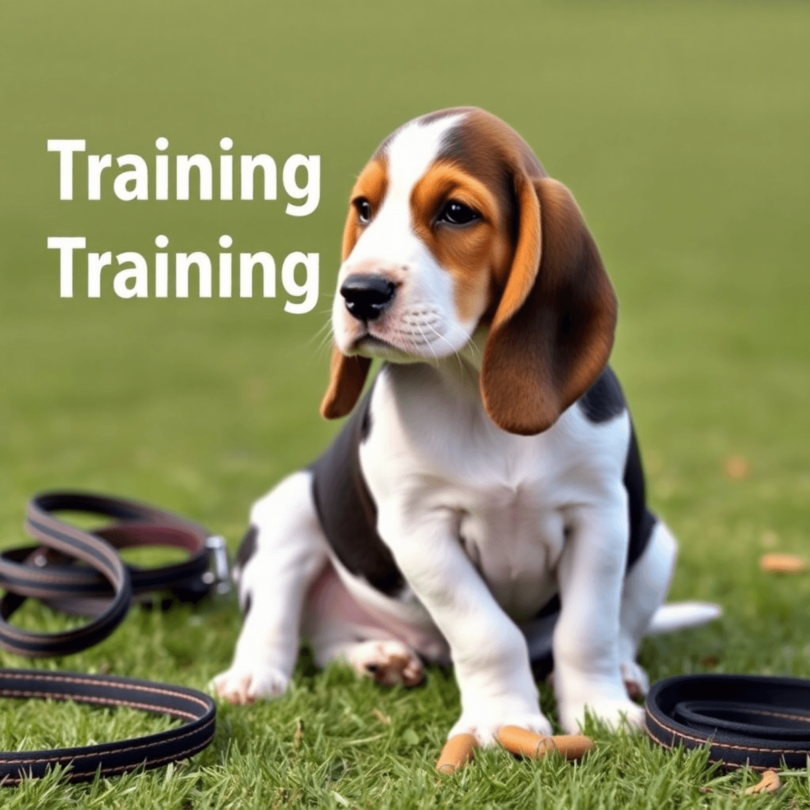Training Your Basset Hound: Essential Tips for Success
Basset Hounds are unique companions with their adorable droopy ears and soulful eyes. They are known for their strong hunting instincts and exceptional sense of smell, but they can also be quite stubborn. These distinct personality traits can make training both challenging and rewarding.
Key Characteristics:
- Stubbornness: Training a Basset Hound requires patience as they often have their own agenda.
- Affectionate Nature: These dogs thrive on companionship, making positive interactions vital during training.
- Strong Sense of Smell: Their instinct to follow scents can lead them off course if not properly trained.
Training a Basset Hound is an adventure filled with ups and downs. Understanding breed-specific behaviors is crucial. By implementing effective training techniques, you can nurture a well-behaved and obedient companion.
To assist new dog owners in this journey, we have gathered 10 essential Basset Hound training tips from experienced trainers. These tips will help you navigate the challenges of Basset Hound obedience training, including aspects like leash and crate training, ensuring a harmonious relationship with your furry friend.
1. Start Training Early
When it comes to Basset Hound puppy training, starting early is essential. These adorable droopy-eared companions may look laid-back, but they can be quite the stubborn learners. Initiating training during their formative months lays the groundwork for a well-mannered adult.
Benefits of early training include:
- Potty Training: Establishing a consistent potty routine helps your Basset Hound understand where it’s appropriate to relieve themselves. The earlier you start, the quicker they’ll grasp these habits.
- Feeding Routines: Regular meal times contribute to predictable bathroom breaks. This structure not only aids in potty training but also fosters a sense of security for your pup.
- Early Socialization: Introducing your Basset to various environments, people, and other pets during their critical socialization period ensures they grow up to be confident and well-adjusted dogs.
Training isn’t just about commands; it’s about building a bond based on trust and understanding. Starting early sets the stage for successful interactions between you and your furry friend, paving the way for a happy, harmonious relationship as they grow.
2. Establish a Consistent Routine
Creating a daily schedule for your Basset Hound can work wonders in their training journey. These charming pups thrive on predictability, and a structured routine helps them feel secure and confident. Here’s how establishing a consistent routine benefits both you and your four-legged friend:
1. Feeding
Set specific times for meals. Regular feeding times not only aid digestion but also help in potty training by predicting bathroom breaks.
2. Potty Breaks
Take your Basset Hound out at the same intervals each day. This consistency reinforces good habits, reducing accidents indoors.
3. Exercise Needs
Incorporate daily walks and play sessions into their routine. Basset Hounds require moderate exercise to maintain a healthy weight and prevent boredom-induced mischief.
When it comes to consistency in training, aim for short, frequent sessions rather than long marathons. Keep commands and cues uniform so your pup understands exactly what you expect from them. Using the same words, gestures, and rewards during each session will reinforce desired behaviors effectively.
The combination of a structured daily routine and consistent training sessions lays the foundation for a well-adjusted Basset Hound who knows what to expect, leading to a happier home for both you and your pup!
3. Focus on Basic Commands First
Training your Basset Hound in basic commands is like laying the first bricks of a solid house—it’s essential for everything that follows. Start with simple yet powerful commands like “No” and “Good.” These words create a foundation for effective communication, guiding your furry friend through the maze of training.
Why Basic Commands Matter
- Establishing Boundaries: Teaching commands such as this one helps your Basset Hound understand what behaviors are unacceptable. This clarity can prevent unwanted actions before they become habits.
- Encouraging Positive Behavior: The command “Good” serves as an affirmation for desired actions, reinforcing positive behavior and making your dog feel accomplished.
Developing this communication foundation early on allows you to connect with your Basset Hound on a deeper level. As they learn to respond to these essential commands, they gain confidence, and you establish trust—two vital ingredients for successful Basset Hound training.
Remember, patience is key! Repetition will solidify these commands in their minds, paving the way for more complex instructions down the road. With a strong base built on basic commands, you’re setting up both yourself and your Basset Hound for training success!
Start as You Mean to Go On
It’s important to remember that how you start training will greatly influence the outcome. So, ensure that you consistently apply these basic commands during every training session.
Also, don’t be discouraged by initial setbacks. Every dog has its own pace of learning. For instance, if you find your Basset Hound struggling with certain commands, consider seeking professional help or advice, similar to what was done in the case of Murphy and Maggie, where expert guidance made a significant difference.
4. Use Positive Reinforcement Techniques
Positive reinforcement training is a fantastic approach for Basset Hounds, who tend to be sensitive and responsive to their owners’ emotions. This method emphasizes rewards rather than punishment, creating a more enjoyable and effective training environment. Here’s why it works wonders:
- Sensitive Nature: Basset Hounds thrive on affection. They are more likely to engage in desired behaviors when they associate them with positive experiences.
- Building Trust: Rewarding good behavior helps foster trust between you and your dog, making them feel safe and loved.
When employing Basset Hound positive reinforcement training, consider these reward options:
- Praise: Verbal affirmations like “Good boy!” or “Well done!” can work wonders. Your enthusiastic tone matters; dogs can sense your excitement!
- Affection: Physical touch, such as belly rubs or gentle pets, reinforces positive behavior and deepens your bond.
- Treats: Small, healthy treats can be effective during training sessions. Use them sparingly to maintain their value while still encouraging good habits.
Remember that consistency in applying these rewards is key. With patience and love, your Basset Hound will not only learn commands but also develop into a well-behaved companion who understands the joy of pleasing you!
5. Incorporate Various Training Methods
Training a Basset Hound can be an exciting adventure when you embrace different approaches. Here are some effective methods to consider:
1. Crate Training
This technique is essential for housebreaking your Basset Hound. Introduce the crate as a cozy den, allowing your pup to feel secure. Gradually increase the time spent in the crate, making it part of their routine. A properly introduced crate becomes a safe haven for your dog.
2. Leash Training Techniques
Teaching your Basset Hound to walk on a leash is crucial for their safety and your sanity. Start with short walks, rewarding them for staying by your side. Use gentle correction if they pull or stray, redirecting their attention back to you with treats and praise. This builds their listening skills and makes walks more enjoyable.
3. Socialization Strategies
Expose your Basset Hound to various environments, people, and other pets early on. This exposure helps prevent behavioral issues later in life. Arrange playdates with friendly dogs or visit local parks to familiarize them with different sights and sounds.
Incorporating these varied training methods not only enhances the learning experience but also strengthens the bond between you and your furry friend. Tailor each technique to fit your Basset Hound’s unique personality for the best results!
6. Be Patient and Firm in Training
Training a Basset Hound can often feel like trying to teach a cat to fetch—challenging but not impossible! These lovable pups are known for their stubbornness, which can lead to moments of frustration during training sessions. Acknowledging this characteristic is the first step toward success.
Tips for Managing Stubbornness:
- Embrace Patience: Understanding that Basset Hounds might take longer to grasp commands is essential. Each dog learns at its own pace, so don’t rush the process.
- Consistent Discipline: Establish clear rules and stick to them. If you allow certain behaviors one day, but not the next, confusion will set in. Consistency helps reinforce what’s expected.
- Use Positive Reinforcement: Celebrate small victories with treats, praise, or playtime. This approach encourages your pup to repeat desired behaviors while fostering a trusting bond.
With patience in dog training and a firm yet gentle approach, you’ll find that your Basset Hound responds positively over time. Embrace the journey, and remember that every stubborn moment brings you closer to a well-behaved companion.
7. Understand Their Unique Personality Traits
Basset Hounds are a mix of breed characteristics and individual quirks, making each one a unique companion. Understanding these traits is crucial for effective training.
- Recognizing Individual Differences: Each Basset Hound has its own temperament, which can significantly influence how they respond to training. Some may be more motivated by play, while others might thrive on affection or treats.
- Adapt to Their Style: Observing your Basset’s reactions can provide insights into what drives them. This allows you to tailor your approach, whether it’s using gentle encouragement for the shy ones or more energetic praise for the spirited pups.
- Experimentation is Key: Don’t hesitate to try various techniques. You might find that your Basset responds better to a specific command style or reward system. This exploration can lead to discovering that perfect method that resonates with your furry friend.
By embracing the unique personality traits of your Basset Hound, you’ll not only enhance their trainability but also deepen the bond between you two. A little patience and creativity in your approach can transform those initial challenges into delightful learning experiences.
8. Socialization is Key to a Well-Rounded Dog
Basset Hounds can be social butterflies or shy wallflowers, depending on their experiences. Early and consistent socialization sets the stage for a confident companion. Here are some Basset Hound socialization tips to get your pup accustomed to the world around them:
- Expose Them Early: Start socializing during the critical period of 3 to 14 weeks. Introduce your Basset Hound to various environments such as parks, busy streets, and friend’s homes.
- Variety is Key: Introduce them to different sounds (like vacuum cleaners or doorbells), sights (such as bicycles and cars), and textures (grass, sand, or water). A well-rounded pup is less likely to be startled by new experiences.
- People Skills: Encourage positive interactions with family members, friends, children, and strangers. Supervised playdates help build their comfort level with different personalities.
- Meet Other Animals: Organize encounters with other dogs and pets. Controlled settings like puppy classes or dog parks are fantastic for promoting good behavior around fellow furballs.
- Short Sessions: Keep socialization sessions brief but frequent. Short bursts of exposure prevent overwhelming your Basset and make learning enjoyable.
A well-socialized Basset Hound grows into a confident adult who enjoys life’s adventures alongside you!
9. Implement Recall Training Techniques
Teaching your Basset Hound a reliable recall command is essential for their safety, especially given their nose-driven tendencies. With a powerful sense of smell and natural hunting instincts, Basset Hounds can easily get sidetracked by intriguing scents, leading them on unsupervised adventures.
To effectively implement Basset Hound recall training, consider the following strategies:
- Start Indoors: Begin training in a controlled environment like your home or backyard. Use a long leash to keep them safe while allowing some freedom.
- Use a Unique Command: Choose a distinct word or phrase that stands out, such as “Come!” or “Here!” Consistency matters; use this command every time you call them.
- Positive Reinforcement: Reward your Basset Hound with treats, praise, or playtime whenever they respond correctly to the recall command. This makes the experience enjoyable and encourages them to come back.
- Gradual Increase in Distractions: Once your dog masters recall indoors, gradually introduce distractions and practice outside. This helps solidify their response in varied environments.
- Practice Regularly: Incorporate short recall exercises into daily routines. Frequent practice leads to better retention and understanding of the command.
By focusing on these techniques, you not only enhance your Basset Hound’s training but also ensure their safety during outdoor adventures.
10. Time Commitment for Successful Training
Training a Basset Hound is not a one-and-done deal; it requires daily engagement in training to foster good behavior and strengthen your bond. Consistency is the name of the game!
Key Points to Consider:
- Short and Frequent Practice Sessions: Rather than long, exhaustive training marathons, aim for multiple short sessions throughout the day. Five to ten minutes per session can be incredibly effective.
- Engagement Through Activities: Incorporate training into daily activities. Use walks as opportunities for practicing commands or rewarding good behavior with praise and affection during playtime.
- Building a Routine: Establishing a set routine that includes time for training ensures that both you and your Basset Hound know what to expect. This predictability helps reinforce learning and enhances their comfort during training.
Investing time not only leads to a well-behaved dog but also creates cherished moments between you and your furry friend. Remember, every minute spent engaging with your Basset Hound pays dividends in their happiness and obedience!
Conclusion
Training a Basset Hound can be both fun and challenging. Here are some important things for new owners to remember:
- Be Patient: Understand that Basset Hounds can be stubborn, so it’s important to stay calm and find ways to work with their personality.
- Be Consistent: Create routines that reinforce good behavior and strengthen communication with your dog.
- Celebrate Progress: No matter how small, celebrate every achievement in your dog’s training. It will boost their confidence.
The journey may have its ups and downs, but with dedication and love, your Basset Hound will flourish. Remember, the key to successful Basset Hound training is building a strong bond with your furry friend. Enjoy every wagging tail, silly smile, and cuddle time together!
FAQs (Frequently Asked Questions)
Why is early training important for Basset Hounds?
Starting training at a young age is crucial for Basset Hounds, who tend to be stubborn learners. Early training helps establish good habits, such as potty training and feeding routines, which contribute to their overall development.
What are the benefits of having a consistent routine for my Basset Hound?
Creating a daily routine for feeding, potty breaks, and exercise helps Basset Hounds thrive both mentally and physically. Consistency in training sessions reinforces desired behaviors effectively, making it easier for them to understand expectations.
What basic commands should I teach my Basset Hound first?
It’s essential to start with simple commands like ‘No’ and ‘Good’. These commands build a strong communication foundation between you and your dog, making it easier to teach more complex behaviors later on.
How do positive reinforcement techniques work with Basset Hounds?
Positive reinforcement methods work particularly well with Basset Hounds due to their sensitive nature. Using praise, affection, and treats as rewards during training sessions encourages them to repeat desired behaviors.
What are some effective training methods for Basset Hounds?
Incorporating various training methods is key. Techniques like crate training for housebreaking and leash walking practice can be very effective. Socializing your Basset Hound with people and other pets is also crucial for their development into well-rounded adults.
How can I manage my Basset Hound’s stubbornness during training?
Being patient and firm in your approach is vital when dealing with a Basset Hound’s stubbornness. Acknowledge the challenges but remember that consistency combined with patience will yield positive results over time.



